Every NewForce Demo Day marks a milestone —not just for our trainees, but for the industries eager to hire them. Over the past five months, NewForce’s Cohort 10 has mastered data analytics tools and techniques, applying them to real-world problems in public health, environmental science, business, and more.
Demo Day is their final step before graduation — and your first chance to meet the next wave of data talent in West Virginia.
NewForce graduates offer a rare blend of technical skill, real-world project experience, and cross-industry insight that makes them highly valuable, especially in today’s data-driven economy.
Here’s why they stand out:
1. They’re Job-Ready Analysts with Hands-On Experience
These aren’t entry-level candidates with just classroom knowledge. Over five months, they’ve built complex, self-directed capstone projects using real-world datasets, APIs, and tools like Python, SQL, Tableau, Power BI, and Excel. From healthcare equity analysis to predictive sales modeling, they’ve already done the kind of work they’d do in a full-time role.
2. They Understand Industry Context
Each project is aligned with a specific industry — from emergency management and environmental sustainability to public policy, healthcare, marketing, and tech. That means these trainees don’t just know how to analyze data — they understand how to turn data into insight that drives decisions in your sector.
3. They Solve Problems with Data
NewForce trainees have shown they can:
- Clean and analyze large datasets
- Build interactive dashboards and visualizations
- Use storytelling to communicate technical findings to non-technical audiences
- Make data-driven recommendations that support business or policy goals
This combination of technical execution + communication is exactly what many organizations struggle to find.
4. They Bring Diverse Professional Backgrounds
Many trainees are career changers, bringing experience from fields like education, healthcare, finance, or hospitality. That means they know how to collaborate, hit deadlines, and adapt — and they bring a deeper understanding of the business problems they’re analyzing.
Tools of the Trade
Throughout the program, trainees gained fluency in:
- Languages & Tools: Python, SQL, Excel, Tableau, Power BI
- Data Techniques: Forecasting, modeling, visualization, mapping, API integration
- Soft Skills: Critical thinking, storytelling with data, professional communication
Their capstone projects demonstrate not only technical proficiency but domain-specific insight. Here’s what Cohort 10 has built — and who should be hiring them.
Capstone Projects:
Environmental, Emergency Management & Sustainability
🔹 Jacob Jarrell – Mountaintop Removal and Flooding in Appalachia
Mapped the link between mining activity and flood risk in Appalachia using Python and Excel.
Skills Showcased: GIS, mapping, environmental impact analysis
This data could be useful for: Emergency management, environmental NGOs
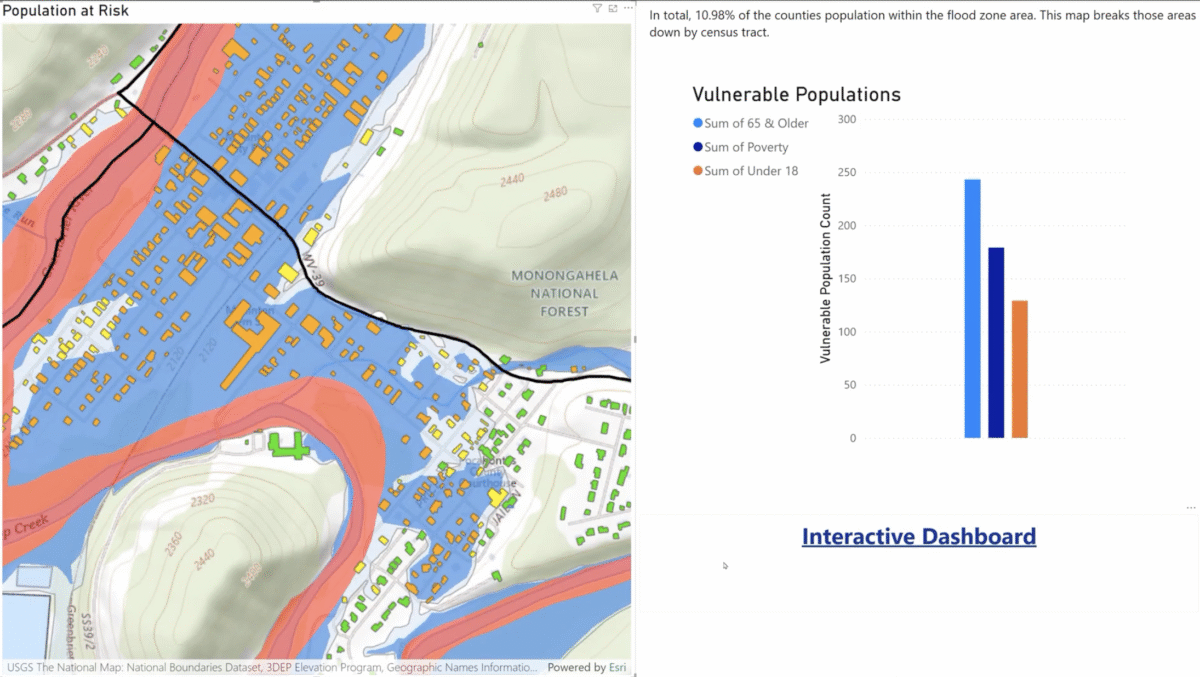
🔹 James Boggs – Historic Weather and Flood Data in Pocahontas County
Built Power BI dashboards from NOAA data to guide flood preparation planning.
Skills: Power BI, GIS, trend analysis
This data could be useful for: Local government, emergency services
🔹 Brandon Taylor – Tornado Activity Trends in the U.S.
Analyzed shifting tornado patterns and regional weather risks.
Skills Showcased: Python, SQL, spatial analysis
This data could be useful for: FEMA, climate research, public safety
🔹 Abi Taylor – Circular Economic Models in Practice
Studied resource-efficient economies using global sustainability data.
Skills Showcased: Python, Excel, comparative economics
This data could be useful for: Sustainability orgs, public policy think tanks
Healthcare & Public Policy
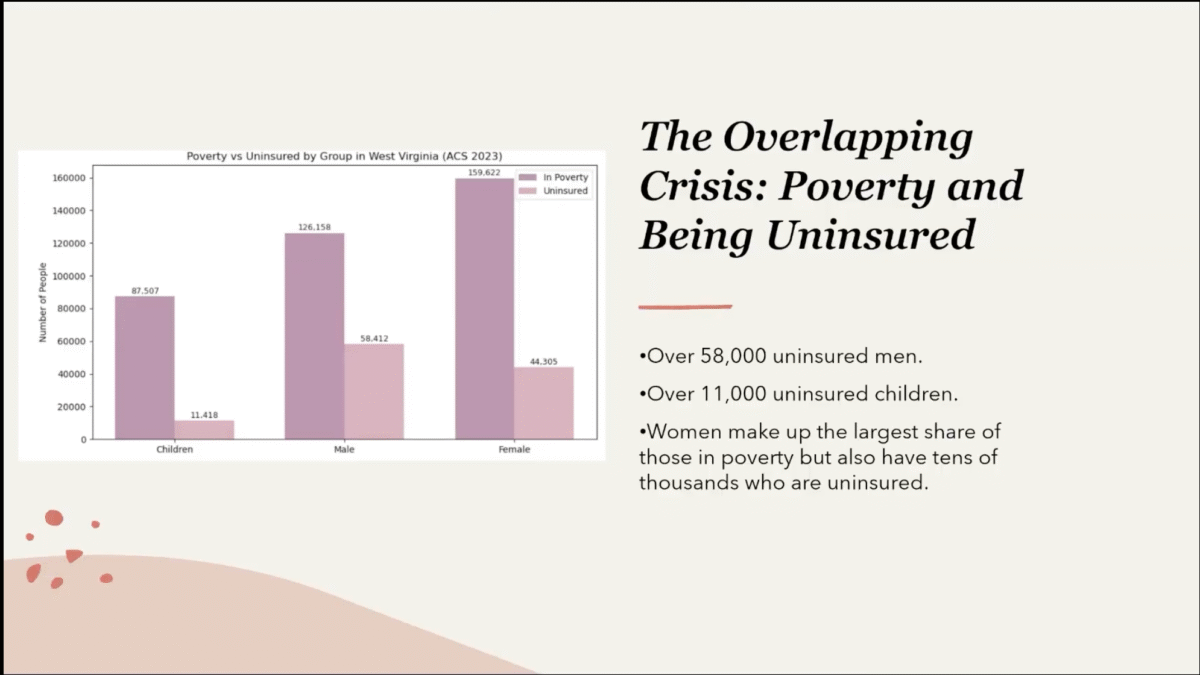
🔹 Madi Smith – Unequal Access: Exploring Healthcare Financial Hardship in WV
Analyzed cost burdens and healthcare access inequality in rural communities.
Skills Showcased: Python, Excel, demographic segmentation
This data could be useful for: Hospitals, health nonprofits, advocacy groups
🔹 Tarik Kalwar – Food Insecurity and Public Policy
Explored how public programs impact food access across the state.
Skills Showcased: Policy analysis, storytelling with data
This data could be useful for: WV DHHR, nonprofits, government researchers
🔹 Marie-Leoni Muabe – The Impact of Daylight Savings Time on Health & Economics
Evaluated correlations between time changes and well-being using Tableau and Python.
Skills Showcased: Tableau dashboards, economic impact analysis
This data could be useful for: Policy institutions, public health researchers
Community Development & Government
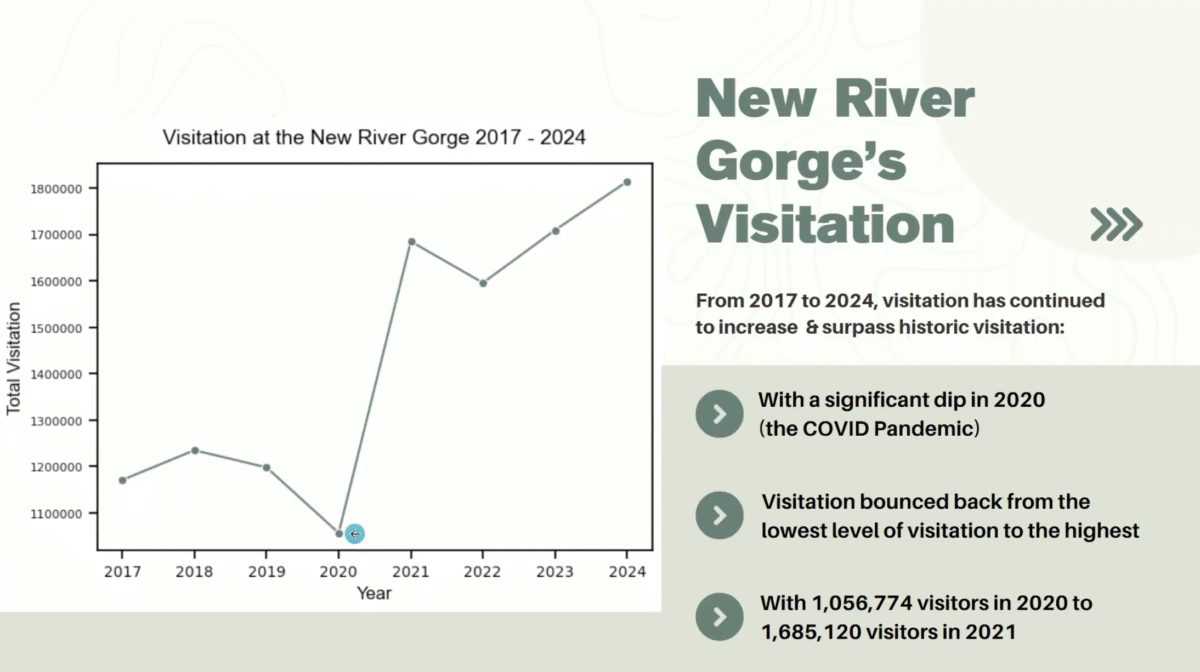
🔹 Brenna Dugan – Visitation Trends in New River Gorge National Park
Visualized post-designation tourism growth in WV’s only national park.
Skills Showcased: Excel maps, forecasting, economic trend analysis
This data could be useful for: Tourism agencies, chambers of commerce
🔹 Emily Cook – Mon Forest Towns Partnership: Action Planning Tool
Developed a planning tool for small-town revitalization initiatives.
Skills Showcased: Stakeholder analysis, qualitative data mapping
This data could be useful for: Regional planning, nonprofit leadership
Business, Marketing, & Economic Modeling
🔹 Ava Melzak – Farmers Market Economic Viability
Analyzed whether local markets can provide sustainable income.
Skills Showcased: Cost-benefit analysis, economic modeling
This data could be useful for: USDA, food councils, rural development agencies
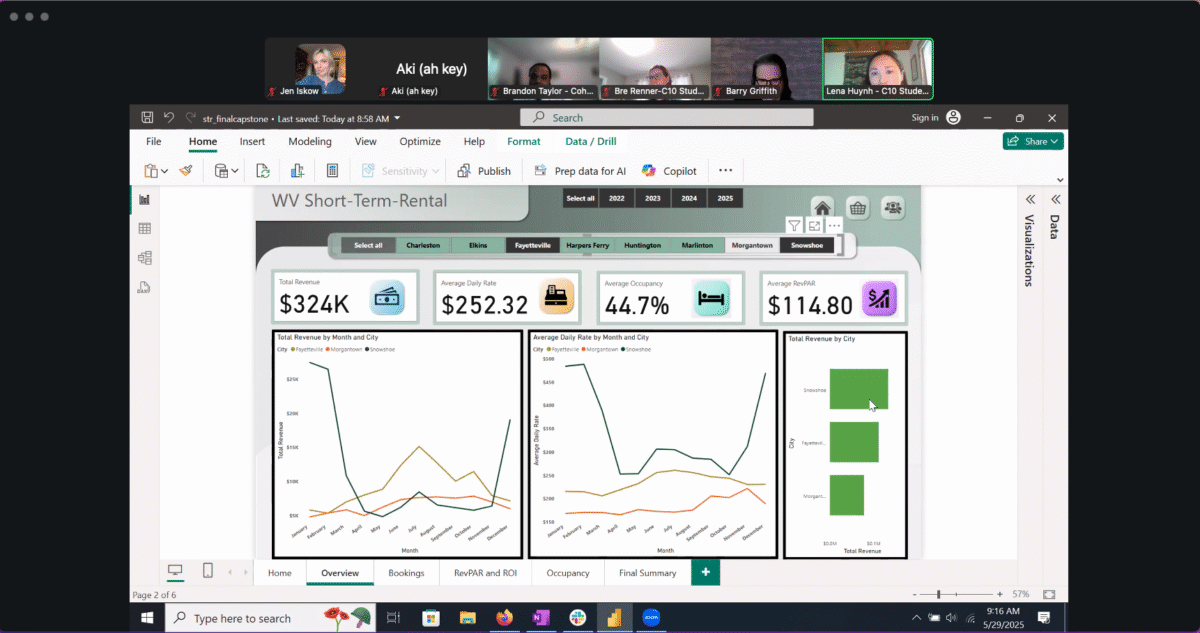
🔹 Lena Huynh – Short-Term Rental Opportunities in West Virginia
Mapped STR revenue potential across towns to guide investor decisions.
Skills Showcased: Tableau, pricing model analysis
This data could be useful for: Real estate firms, tourism offices
🔹 Zachary Hoffman – The Economics of Pokémon
Forecasted sales trends of Pokémon game releases using brand modeling.
Skills Showcased: Power BI, predictive modeling
This data could be useful for: Gaming companies, marketing firms
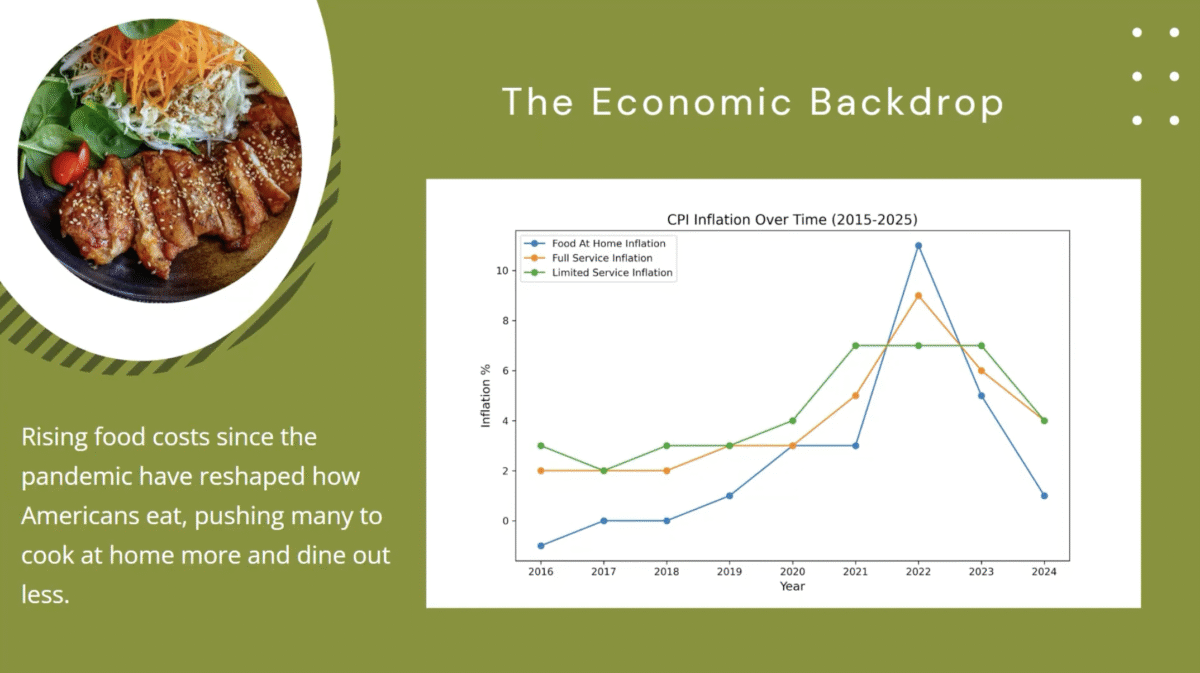
🔹 Bre Renner – Home-Cooked Savings: The Financial Impact of Eating at Home
Built a custom survey and dashboard to analyze consumer food spending.
Skills Showcased: Tableau, original data collection, storytelling
This data could be useful for: Restaurant chains, financial planners, market analysts
Behavioral, Cultural & Platform Analysis
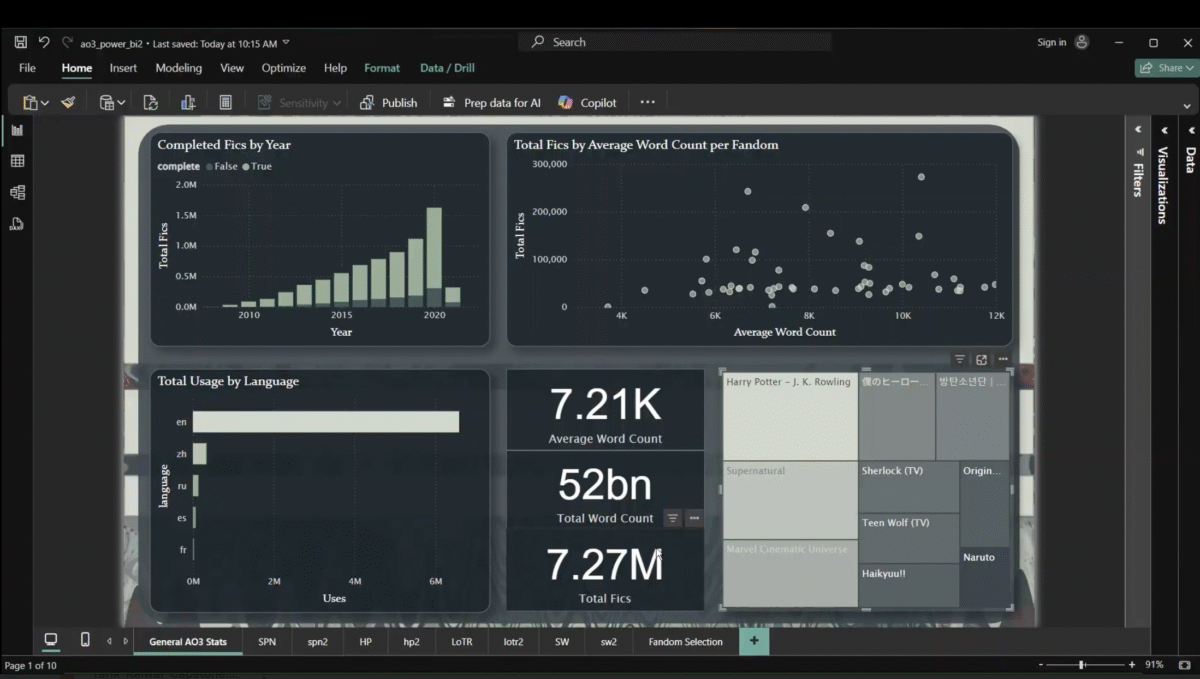
🔹 Isabelle Pethtel – Fan Fiction Lifecycle on Archive of Our Own (AO3)
Scraped and analyzed fanwork engagement over time.
Skills Showcased: API integration, Power BI, behavioral analysis
This data could be useful for: Media companies, digital engagement firms
Urban Design, Health & Mobility
🔹 Juan Casas Doza – Walkability & Public Transit as Economic Indicators
Connected infrastructure access to health and economic outcomes.
Skills Showcased: Python, spatial economics, data storytelling
This data could be useful for: Public health agencies, city planners
What Demo Day Means for Employers
Each capstone is more than a portfolio piece — it’s proof of concept. These graduates are ready to:
✅ Communicate complex insights clearly
✅ Build data solutions aligned with industry goals
✅ Join your team and hit the ground running
Connect with NewForce Talent
If you’re hiring for data analysts, business intelligence specialists, or strategic thinkers — this is your moment.
Reach out to Generation West Virginia to:
- Access full project portfolios
- Schedule introductions or interviews
- Get matched with candidates based on your hiring needs
Let’s turn Demo Day into Day One on the job.
Contact: Casey Patterson, NewForce Program Director at casey@generationwv.org.
